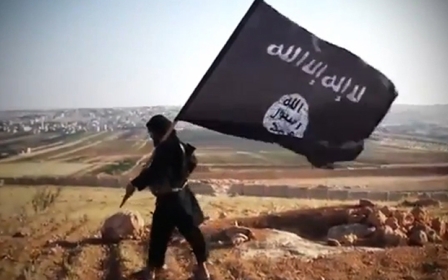Kerry makes unannounced stop in Iraq on anti-IS tour

US Secretary of State John Kerry confirmed that 40 states have said they will participate in a “war” against militants dubbing themselves Islamic State (IS), in a speech given during a surprise visit to Iraq on Wednesday.
In an unannounced stop-off on a regional tour aimed at gaining the support of regional powers for a US-led anti-IS coalition, Kerry told reporters in Iraq that failure is not an option in the “war against terror.”
The visit comes ahead of a key security meeting with 10 Arab countries and Turkey to be held in Saudi Arabia tomorrow.
“Our global coalition will succeed in eliminating the threat from Iraq, from the region and the world,” Kerry said.
While stressing the importance of building a broad international movement against IS, Kerry also indicated that Iraq, which he earlier called a "critical partner" against the militants, must play a strong role.
He said the Iraqi army would be "reconstituted" with help from the US and other partners, and told Iraqi politicians that concessions are needed on all sides to heal rifts within Iraqi society which many blame for the rise of IS.
Though Kerry did not indicate whether the US strategy will include airstrikes in Syria, he did say that the administration had evidence that poisonous chlorine gas during the conflict, a claimed backed up today by the Organisation for the Prohibition of Chemical Weapons, a key watchdog.
However, Sky News reported on Wednesday that President Obama had asked the US Congress for authorisation to train and arm the Syrian opposition, although the White House has yet to confirm the news.
Obama is now expected to give a speech at 21:00 local time (01:00 GMT) - on what will be the eve of the thirteenth anniversary of the September 11 attacks - in which he will outline his strategy for tackling the threat from Islamic State.
Kerry promised that President Obama would outline a strategy “in great specificity”, hinting that Washington’s campaign “won’t just be bombs” and that it will involve “nearly every country on Earth”.
Obama spoke to King Abdullah of Saudi Arabia by telephone ahead of his big security announcements, Turkish Adanolu Agency reported.
Saudi Arabia is thought to be a key partner in Washington’s strategy to defeat IS, although it has a strained relationship with the Shiite-dominated government in Baghdad and has long criticised what it sees as Obama's weakness over Syria.
Washington has carried out more than a month worth of air strikes against IS fighters in Iraq, but despite the Pentagon's acknowledgement that the group cannot be defeated without action against it in Syria, Obama had until now firmly held back, fearing that strikes would benefit President Bashar al-Assad.
Washington has pinned its hopes of holding back IS on Syrian rebel groups opposed to the militants - balking at cooperation of any sort with Assad who is embroiled in a bloody three-and-a-half-year uprising against his rule - but these groups have so far largely failed to halt the IS advance. On Tuesday, a massive blast in northern Syria killed at least 28 rebel leaders from the largest opposition alliance fighting IS. It is unknown who carried out the attack.
The issue is likely to be hotly debated in Jeddah tomorrow during the widely anticipated Saudi security talks on IS.
Saudi Arabia and other Gulf Arab states have had deeply strained relations with the Shiite-led government in Baghdad, with each side blaming the other for the militants' gains. But their foreign ministers will be among those attending the talks, along with top diplomats from Egypt, Jordan, Lebanon, Turkey and Iraq itself. Syria, which has long tried to present itself as a bulwark against militants, will be notably absent from the talks, as will ally Iran.
The meeting will address "terrorism in the region, extremist organisations behind it and means of fighting them," Saudi state media said.
The Arab League, which has stopped short of explicitly backing ongoing US air strikes against IS, also drummed up regional support for the fight.
France is also expected to host an international conference on peace and security in Iraq next week and President Francois Hollande will make a preparatory visit to Baghdad on Friday, his office announced.
Britain, which has been carrying out reconnaissance flights in support of the US air campaign, announced on Tuesday it would ship $2.6 million worth of weapons to Kurdish forces fighting the militants in northern Iraq.
Stay informed with MEE's newsletters
Sign up to get the latest alerts, insights and analysis, starting with Turkey Unpacked
Middle East Eye delivers independent and unrivalled coverage and analysis of the Middle East, North Africa and beyond. To learn more about republishing this content and the associated fees, please fill out this form. More about MEE can be found here.





